- Home
- G. K. Chesterton
The Ball and the Cross
The Ball and the Cross Read online
Produced by Ben Crowder
THE BALL AND THE CROSS
G.K. Chesterton
CONTENTS
I. A Discussion Somewhat in the Air II. The Religion of the Stipendiary Magistrate III. Some Old Curiosities IV. A Discussion at Dawn V. The Peacemaker VI. The Other Philosopher VII. The Village of Grassley-in-the-Hole VIII. An Interlude of Argument IX. The Strange Lady X. The Swords Rejoined XI. A Scandal in the Village XII. The Desert Island XIII. The Garden of Peace XIV. A Museum of Souls XV. The Dream of MacIan XVI. The Dream of Turnbull XVII. The IdiotXVIII. A Riddle of Faces XIX. The Last Parley XX. Dies Irae
I. A DISCUSSION SOMEWHAT IN THE AIR
The flying ship of Professor Lucifer sang through the skies like asilver arrow; the bleak white steel of it, gleaming in the bleakblue emptiness of the evening. That it was far above the earth was noexpression for it; to the two men in it, it seemed to be far above thestars. The professor had himself invented the flying machine, and hadalso invented nearly everything in it. Every sort of tool or apparatushad, in consequence, to the full, that fantastic and distorted lookwhich belongs to the miracles of science. For the world of science andevolution is far more nameless and elusive and like a dream than theworld of poetry and religion; since in the latter images and ideasremain themselves eternally, while it is the whole idea of evolutionthat identities melt into each other as they do in a nightmare.
All the tools of Professor Lucifer were the ancient human tools gonemad, grown into unrecognizable shapes, forgetful of their origin,forgetful of their names. That thing which looked like an enormous keywith three wheels was really a patent and very deadly revolver. Thatobject which seemed to be created by the entanglement of two corkscrewswas really the key. The thing which might have been mistaken for atricycle turned upside-down was the inexpressibly important instrumentto which the corkscrew was the key. All these things, as I say, theprofessor had invented; he had invented everything in the flying ship,with the exception, perhaps, of himself. This he had been born toolate actually to inaugurate, but he believed at least, that he hadconsiderably improved it.
There was, however, another man on board, so to speak, at the time. Him,also, by a curious coincidence, the professor had not invented, and himhe had not even very greatly improved, though he had fished him up witha lasso out of his own back garden, in Western Bulgaria, with the pureobject of improving him. He was an exceedingly holy man, almost entirelycovered with white hair. You could see nothing but his eyes, and heseemed to talk with them. A monk of immense learning and acute intellecthe had made himself happy in a little stone hut and a little stonygarden in the Balkans, chiefly by writing the most crushing refutationsof exposures of certain heresies, the last professors of which had beenburnt (generally by each other) precisely 1,119 years previously. Theywere really very plausible and thoughtful heresies, and it was reallya creditable or even glorious circumstance, that the old monk had beenintellectual enough to detect their fallacy; the only misfortunewas that nobody in the modern world was intellectual enough even tounderstand their argument. The old monk, one of whose names was Michael,and the other a name quite impossible to remember or repeat in ourWestern civilization, had, however, as I have said, made himself quitehappy while he was in a mountain hermitage in the society of wildanimals. And now that his luck had lifted him above all the mountains inthe society of a wild physicist, he made himself happy still.
"I have no intention, my good Michael," said Professor Lucifer,"of endeavouring to convert you by argument. The imbecility of yourtraditions can be quite finally exhibited to anybody with mere ordinaryknowledge of the world, the same kind of knowledge which teaches usnot to sit in draughts or not to encourage friendliness in impecuniouspeople. It is folly to talk of this or that demonstrating therationalist philosophy. Everything demonstrates it. Rubbing shoulderswith men of all kinds----"
"You will forgive me," said the monk, meekly from under loads of whitebeard, "but I fear I do not understand; was it in order that I might rubmy shoulder against men of all kinds that you put me inside this thing?"
"An entertaining retort, in the narrow and deductive manner of theMiddle Ages," replied the Professor, calmly, "but even upon your ownbasis I will illustrate my point. We are up in the sky. In your religionand all the religions, as far as I know (and I know everything), the skyis made the symbol of everything that is sacred and merciful. Well, nowyou are in the sky, you know better. Phrase it how you like, twist ithow you like, you know that you know better. You know what are a man'sreal feelings about the heavens, when he finds himself alone in theheavens, surrounded by the heavens. You know the truth, and the truthis this. The heavens are evil, the sky is evil, the stars are evil. Thismere space, this mere quantity, terrifies a man more than tigers or theterrible plague. You know that since our science has spoken, the bottomhas fallen out of the Universe. Now, heaven is the hopeless thing,more hopeless than any hell. Now, if there be any comfort for all yourmiserable progeny of morbid apes, it must be in the earth, underneathyou, under the roots of the grass, in the place where hell was of old.The fiery crypts, the lurid cellars of the underworld, to which you oncecondemned the wicked, are hideous enough, but at least they are morehomely than the heaven in which we ride. And the time will come when youwill all hide in them, to escape the horror of the stars."
"I hope you will excuse my interrupting you," said Michael, with aslight cough, "but I have always noticed----"
"Go on, pray go on," said Professor Lucifer, radiantly, "I really liketo draw out your simple ideas."
"Well, the fact is," said the other, "that much as I admire yourrhetoric and the rhetoric of your school, from a purely verbal pointof view, such little study of you and your school in human history as Ihave been enabled to make has led me to--er--rather singular conclusion,which I find great difficulty in expressing, especially in a foreignlanguage."
"Come, come," said the Professor, encouragingly, "I'll help you out. Howdid my view strike you?"
"Well, the truth is, I know I don't express it properly, but somehowit seemed to me that you always convey ideas of that kind with mosteloquence, when--er--when----"
"Oh! get on," cried Lucifer, boisterously.
"Well, in point of fact when your flying ship is just going to runinto something. I thought you wouldn't mind my mentioning it, but it'srunning into something now."
Lucifer exploded with an oath and leapt erect, leaning hard upon thehandle that acted as a helm to the vessel. For the last ten minutes theyhad been shooting downwards into great cracks and caverns of cloud. Now,through a sort of purple haze, could be seen comparatively near to themwhat seemed to be the upper part of a huge, dark orb or sphere, islandedin a sea of cloud. The Professor's eyes were blazing like a maniac's.
"It is a new world," he cried, with a dreadful mirth. "It is a newplanet and it shall bear my name. This star and not that other vulgarone shall be 'Lucifer, sun of the morning.' Here we will have nochartered lunacies, here we will have no gods. Here man shall beas innocent as the daisies, as innocent and as cruel--here theintellect----"
"There seems," said Michael, timidly, "to be something sticking up inthe middle of it."
"So there is," said the Professor, leaning over the side of the ship,his spectacles shining with intellectual excitement. "What can it be? Itmight of course be merely a----"
Then a shriek indescribable broke out of him of a sudden, and he flungup his arms like a lost spirit. The monk took the helm in a tired way;he did not seem much astonished for he came from an ignorant part of theworld in which it is not uncommon for lost spirits to shriek when theysee the curious shape which the Professor had just seen on the top ofthe mysterious ball, but he took the helm only just
in time, and bydriving it hard to the left he prevented the flying ship from smashinginto St. Paul's Cathedral.
A plain of sad-coloured cloud lay along the level of the top of theCathedral dome, so that the ball and the cross looked like a buoy ridingon a leaden sea. As the flying ship swept towards it, this plain ofcloud looked as dry and definite and rocky as any grey desert. Hence itgave to the mind and body a sharp and unearthly sensation when the shipcut and sank into the cloud as into any common mist, a thing withoutresistance. There was, as it were, a deadly shock in the fact that therewas no shock. It was as if they had cloven into ancient cliffs like somuch butter. But sensations awaited them which were much stranger thanthose of sinking through the solid earth. For a moment their eyes andnostrils were stopped with darkness and opaque cloud; then the darknesswarmed into a kind of brown fog. And far, far below them the brown fogfell until it warmed into fire. Through the dense London atmosphere theycould see below them the flaming London lights; lights which lay beneaththem in squares and oblongs of fire. The fog and fire were mixed in apassionate vapour; you might say that the fog was drowning the flames;or you might say that the flames had set the fog on fire. Beside theship and beneath it (for it swung just under the ball), the immeasurabledome itself shot out and down into the dark like a combination ofvoiceless cataracts. Or it was like some cyclopean sea-beast sittingabove London and letting down its tentacles bewilderingly on every side,a monstrosity in that starless heaven. For the clouds that belonged toLondon had closed over the heads of the voyagers sealing up the entranceof the upper air. They had broken through a roof and come into a templeof twilight.
They were so near to the ball that Lucifer leaned his hand against it,holding the vessel away, as men push a boat off from a bank. Above itthe cross already draped in the dark mists of the borderland was shadowyand more awful in shape and size.
Professor Lucifer slapped his hand twice upon the surface of the greatorb as if he were caressing some enormous animal. "This is the fellow,"he said, "this is the one for my money."
"May I with all respect inquire," asked the old monk, "what on earth youare talking about?"
"Why this," cried Lucifer, smiting the ball again, "here is the onlysymbol, my boy. So fat. So satisfied. Not like that scraggy individual,stretching his arms in stark weariness." And he pointed up to the cross,his face dark with a grin. "I was telling you just now, Michael, that Ican prove the best part of the rationalist case and the Christian humbugfrom any symbol you liked to give me, from any instance I came across.Here is an instance with a vengeance. What could possibly express yourphilosophy and my philosophy better than the shape of that cross andthe shape of this ball? This globe is reasonable; that cross isunreasonable. It is a four-legged animal, with one leg longer than theothers. The globe is inevitable. The cross is arbitrary. Above all theglobe is at unity with itself; the cross is primarily and above allthings at enmity with itself. The cross is the conflict of two hostilelines, of irreconcilable direction. That silent thing up there isessentially a collision, a crash, a struggle in stone. Pah! thatsacred symbol of yours has actually given its name to a description ofdesperation and muddle. When we speak of men at once ignorant of eachother and frustrated by each other, we say they are at cross-purposes.Away with the thing! The very shape of it is a contradiction in terms."
"What you say is perfectly true," said Michael, with serenity. "But welike contradictions in terms. Man is a contradiction in terms; he is abeast whose superiority to other beasts consists in having fallen. Thatcross is, as you say, an eternal collision; so am I. That is a strugglein stone. Every form of life is a struggle in flesh. The shape ofthe cross is irrational, just as the shape of the human animal isirrational. You say the cross is a quadruped with one limb longer thanthe rest. I say man is a quadruped who only uses two of his legs."
The Professor frowned thoughtfully for an instant, and said: "Ofcourse everything is relative, and I would not deny that the elementof struggle and self-contradiction, represented by that cross, has anecessary place at a certain evolutionary stage. But surely the crossis the lower development and the sphere the higher. After all it iseasy enough to see what is really wrong with Wren's architecturalarrangement."
"And what is that, pray?" inquired Michael, meekly.
"The cross is on top of the ball," said Professor Lucifer, simply. "Thatis surely wrong. The ball should be on top of the cross. The cross is amere barbaric prop; the ball is perfection. The cross at its best is butthe bitter tree of man's history; the ball is the rounded, the ripe andfinal fruit. And the fruit should be at the top of the tree, not at thebottom of it."
"Oh!" said the monk, a wrinkle coming into his forehead, "so you thinkthat in a rationalistic scheme of symbolism the ball should be on top ofthe cross?"
"It sums up my whole allegory," said the professor.
"Well, that is really very interesting," resumed Michael slowly,"because I think in that case you would see a most singular effect, aneffect that has generally been achieved by all those able and powerfulsystems which rationalism, or the religion of the ball, has produced tolead or teach mankind. You would see, I think, that thing happen whichis always the ultimate embodiment and logical outcome of your logicalscheme."
"What are you talking about?" asked Lucifer. "What would happen?"
"I mean it would fall down," said the monk, looking wistfully into thevoid.
Lucifer made an angry movement and opened his mouth to speak, butMichael, with all his air of deliberation, was proceeding before hecould bring out a word.
"I once knew a man like you, Lucifer," he said, with a maddeningmonotony and slowness of articulation. "He took this----"
"There is no man like me," cried Lucifer, with a violence that shook theship.
"As I was observing," continued Michael, "this man also took theview that the symbol of Christianity was a symbol of savagery and allunreason. His history is rather amusing. It is also a perfect allegoryof what happens to rationalists like yourself. He began, of course, byrefusing to allow a crucifix in his house, or round his wife's neck,or even in a picture. He said, as you say, that it was an arbitraryand fantastic shape, that it was a monstrosity, loved because it wasparadoxical. Then he began to grow fiercer and more eccentric; he wouldbatter the crosses by the roadside; for he lived in a Roman Catholiccountry. Finally in a height of frenzy he climbed the steeple ofthe Parish Church and tore down the cross, waving it in the air, anduttering wild soliloquies up there under the stars. Then one stillsummer evening as he was wending his way homewards, along a lane, thedevil of his madness came upon him with a violence and transfigurationwhich changes the world. He was standing smoking, for a moment, in thefront of an interminable line of palings, when his eyes were opened. Nota light shifted, not a leaf stirred, but he saw as if by a sudden changein the eyesight that this paling was an army of innumerable crosseslinked together over hill and dale. And he whirled up his heavy stickand went at it as if at an army. Mile after mile along his homeward pathhe broke it down and tore it up. For he hated the cross and every palingis a wall of crosses. When he returned to his house he was a literalmadman. He sat upon a chair and then started up from it for thecross-bars of the carpentry repeated the intolerable image. He flunghimself upon a bed only to remember that this, too, like all workmanlikethings, was constructed on the accursed plan. He broke his furniturebecause it was made of crosses. He burnt his house because it was madeof crosses. He was found in the river."
Lucifer was looking at him with a bitten lip.
"Is that story really true?" he asked.
"Oh, no," said Michael, airily. "It is a parable. It is a parable of youand all your rationalists. You begin by breaking up the Cross; but youend by breaking up the habitable world. We leave you saying that nobodyought to join the Church against his will. When we meet you again youare saying that no one has any will to join it with. We leave you sayingthat there is no such place as Eden. We find you saying that there is nosuch place as Ireland. You start by hating t
he irrational and you cometo hate everything, for everything is irrational and so----"
Lucifer leapt upon him with a cry like a wild beast's. "Ah," hescreamed, "to every man his madness. You are mad on the cross. Let itsave you."
And with a herculean energy he forced the monk backwards out of thereeling car on to the upper part of the stone ball. Michael, withas abrupt an agility, caught one of the beams of the cross and savedhimself from falling. At the same instant Lucifer drove down a lever andthe ship shot up with him in it alone.
"Ha! ha!" he yelled, "what sort of a support do you find it, oldfellow?"
"For practical purposes of support," replied Michael grimly, "it is atany rate a great deal better than the ball. May I ask if you are goingto leave me here?"
"Yes, yes. I mount! I mount!" cried the professor in ungovernableexcitement. "_Altiora peto_. My path is upward."
"How often have you told me, Professor, that there is really no up ordown in space?" said the monk. "I shall mount up as much as you will."
"Indeed," said Lucifer, leering over the side of the flying ship. "May Iask what you are going to do?"
The monk pointed downward at Ludgate Hill. "I am going," he said, "toclimb up into a star."
Those who look at the matter most superficially regard paradox assomething which belongs to jesting and light journalism. Paradox of thiskind is to be found in the saying of the dandy, in the decadent comedy,"Life is much too important to be taken seriously." Those who look atthe matter a little more deeply or delicately see that paradox is athing which especially belongs to all religions. Paradox of this kind isto be found in such a saying as "The meek shall inherit the earth."But those who see and feel the fundamental fact of the matter know thatparadox is a thing which belongs not to religion only, but to all vividand violent practical crises of human living. This kind of paradox maybe clearly perceived by anybody who happens to be hanging in mid-space,clinging to one arm of the Cross of St. Paul's.
Father Michael in spite of his years, and in spite of his asceticism(or because of it, for all I know), was a very healthy and happy oldgentleman. And as he swung on a bar above the sickening emptiness ofair, he realized, with that sort of dead detachment which belongs to thebrains of those in peril, the deathless and hopeless contradiction whichis involved in the mere idea of courage. He was a happy and healthy oldgentleman and therefore he was quite careless about it. And he felt asevery man feels in the taut moment of such terror that his chief dangerwas terror itself; his only possible strength would be a coolnessamounting to carelessness, a carelessness amounting almost to a suicidalswagger. His one wild chance of coming out safely would be in not toodesperately desiring to be safe. There might be footholds down thatawful facade, if only he could not care whether they were footholds orno. If he were foolhardy he might escape; if he were wise he wouldstop where he was till he dropped from the cross like a stone. And thisantinomy kept on repeating itself in his mind, a contradiction as largeand staring as the immense contradiction of the Cross; he rememberedhaving often heard the words, "Whosoever shall lose his life the sameshall save it." He remembered with a sort of strange pity that this hadalways been made to mean that whoever lost his physical life should savehis spiritual life. Now he knew the truth that is known to all fighters,and hunters, and climbers of cliffs. He knew that even his animal lifecould only be saved by a considerable readiness to lose it.
Some will think it improbable that a human soul swinging desperatelyin mid-air should think about philosophical inconsistencies. But suchextreme states are dangerous things to dogmatize about. Frequently theyproduce a certain useless and joyless activity of the mere intellect,thought not only divorced from hope but even from desire. And if it isimpossible to dogmatize about such states, it is still more impossibleto describe them. To this spasm of sanity and clarity in Michael's mindsucceeded a spasm of the elemental terror; the terror of the animalin us which regards the whole universe as its enemy; which, when it isvictorious, has no pity, and so, when it is defeated has no imaginablehope. Of that ten minutes of terror it is not possible to speak in humanwords. But then again in that damnable darkness there began to growa strange dawn as of grey and pale silver. And of this ultimateresignation or certainty it is even less possible to write; it issomething stranger than hell itself; it is perhaps the last of thesecrets of God. At the highest crisis of some incurable anguish therewill suddenly fall upon the man the stillness of an insane contentment.It is not hope, for hope is broken and romantic and concerned with thefuture; this is complete and of the present. It is not faith, forfaith by its very nature is fierce, and as it were at once doubtful anddefiant; but this is simply a satisfaction. It is not knowledge, forthe intellect seems to have no particular part in it. Nor is it (as themodern idiots would certainly say it is) a mere numbness or negativeparalysis of the powers of grief. It is not negative in the least; itis as positive as good news. In some sense, indeed, it is good news. Itseems almost as if there were some equality among things, some balancein all possible contingencies which we are not permitted to know lest weshould learn indifference to good and evil, but which is sometimes shownto us for an instant as a last aid in our last agony.
Michael certainly could not have given any sort of rational account ofthis vast unmeaning satisfaction which soaked through him and filled himto the brim. He felt with a sort of half-witted lucidity that the crosswas there, and the ball was there, and the dome was there, that he wasgoing to climb down from them, and that he did not mind in the leastwhether he was killed or not. This mysterious mood lasted long enough tostart him on his dreadful descent and to force him to continue it. Butsix times before he reached the highest of the outer galleries terrorhad returned on him like a flying storm of darkness and thunder. Bythe time he had reached that place of safety he almost felt (as in someimpossible fit of drunkenness) that he had two heads; one was calm,careless, and efficient; the other saw the danger like a deadly map,was wise, careful, and useless. He had fancied that he would have to lethimself vertically down the face of the whole building. When he droppedinto the upper gallery he still felt as far from the terrestrial globeas if he had only dropped from the sun to the moon. He paused a little,panting in the gallery under the ball, and idly kicked his heels, movinga few yards along it. And as he did so a thunderbolt struck his soul.A man, a heavy, ordinary man, with a composed indifferent face, and aprosaic sort of uniform, with a row of buttons, blocked his way. Michaelhad no mind to wonder whether this solid astonished man, with the brownmoustache and the nickel buttons, had also come on a flying ship. Hemerely let his mind float in an endless felicity about the man. Hethought how nice it would be if he had to live up in that gallery withthat one man for ever. He thought how he would luxuriate in the namelessshades of this man's soul and then hear with an endless excitement aboutthe nameless shades of the souls of all his aunts and uncles. A momentbefore he had been dying alone. Now he was living in the same world witha man; an inexhaustible ecstasy. In the gallery below the ball FatherMichael had found that man who is the noblest and most divine and mostlovable of all men, better than all the saints, greater than all theheroes--man Friday.
In the confused colour and music of his new paradise, Michael heard onlyin a faint and distant fashion some remarks that this beautiful solidman seemed to be making to him; remarks about something or other beingafter hours and against orders. He also seemed to be asking how Michael"got up" there. This beautiful man evidently felt as Michael did thatthe earth was a star and was set in heaven.
At length Michael sated himself with the mere sensual music of the voiceof the man in buttons. He began to listen to what he said, and even tomake some attempt at answering a question which appeared to have beenput several times and was now put with some excess of emphasis. Michaelrealized that the image of God in nickel buttons was asking him howhe had come there. He said that he had come in Lucifer's ship. Onhis giving this answer the demeanour of the image of God underwent aremarkable change. From addressing Michael gruffly
, as if he were amalefactor, he began suddenly to speak to him with a sort of eagerand feverish amiability as if he were a child. He seemed particularlyanxious to coax him away from the balustrade. He led him by the armtowards a door leading into the building itself, soothing him all thetime. He gave what even Michael (slight as was his knowledge of theworld) felt to be an improbable account of the sumptuous pleasuresand varied advantages awaiting him downstairs. Michael followed him,however, if only out of politeness, down an apparently interminablespiral of staircase. At one point a door opened. Michael stepped throughit, and the unaccountable man in buttons leapt after him and pinionedhim where he stood. But he only wished to stand; to stand and stare.He had stepped as it were into another infinity, out under the dome ofanother heaven. But this was a dome of heaven made by man. The gold andgreen and crimson of its sunset were not in the shapeless clouds but inshapes of cherubim and seraphim, awful human shapes with a passionateplumage. Its stars were not above but far below, like fallen stars stillin unbroken constellations; the dome itself was full of darkness.And far below, lower even than the lights, could be seen creeping ormotionless, great black masses of men. The tongue of a terrible organseemed to shake the very air in the whole void; and through it therecame up to Michael the sound of a tongue more terrible; the dreadfuleverlasting voice of man, calling to his gods from the beginning to theend of the world. Michael felt almost as if he were a god, and all thevoices were hurled at him.
"No, the pretty things aren't here," said the demi-god in buttons,caressingly. "The pretty things are downstairs. You come along with me.There's something that will surprise you downstairs; something you wantvery much to see."
Evidently the man in buttons did not feel like a god, so Michael made noattempt to explain his feelings to him, but followed him meekly enoughdown the trail of the serpentine staircase. He had no notion where or atwhat level he was. He was still full of the cold splendour of space,and of what a French writer has brilliantly named the "vertigo of theinfinite," when another door opened, and with a shock indescribable hefound himself on the familiar level, in a street full of faces, with thehouses and even the lamp-posts above his head. He felt suddenly happyand suddenly indescribably small. He fancied he had been changed into achild again; his eyes sought the pavement seriously as children's do, asif it were a thing with which something satisfactory could be done.He felt the full warmth of that pleasure from which the proud shutthemselves out; the pleasure which not only goes with humiliation, butwhich almost is humiliation. Men who have escaped death by a hair haveit, and men whose love is returned by a woman unexpectedly, and menwhose sins are forgiven them. Everything his eye fell on it feasted on,not aesthetically, but with a plain, jolly appetite as of a boy eatingbuns. He relished the squareness of the houses; he liked their cleanangles as if he had just cut them with a knife. The lit squares of theshop windows excited him as the young are excited by the lit stage ofsome promising pantomime. He happened to see in one shop which projectedwith a bulging bravery on to the pavement some square tins of pottedmeat, and it seemed like a hint of a hundred hilarious high teas in ahundred streets of the world. He was, perhaps, the happiest of all thechildren of men. For in that unendurable instant when he hung, halfslipping, to the ball of St. Paul's, the whole universe had beendestroyed and re-created.
Suddenly through all the din of the dark streets came a crash of glass.With that mysterious suddenness of the Cockney mob, a rush was madein the right direction, a dingy office, next to the shop of the pottedmeat. The pane of glass was lying in splinters about the pavement. Andthe police already had their hands on a very tall young man, with dark,lank hair and dark, dazed eyes, with a grey plaid over his shoulder, whohad just smashed the shop window with a single blow of his stick.
"I'd do it again," said the young man, with a furious white face."Anybody would have done it. Did you see what it said? I swear I'd do itagain." Then his eyes encountered the monkish habit of Michael, and hepulled off his grey tam-o'-shanter with the gesture of a Catholic.
"Father, did you see what they said?" he cried, trembling. "Did you seewhat they dared to say? I didn't understand it at first. I read it halfthrough before I broke the window."
Michael felt he knew not how. The whole peace of the world was pent uppainfully in his heart. The new and childlike world which he had seenso suddenly, men had not seen at all. Here they were still at their oldbewildering, pardonable, useless quarrels, with so much to be said onboth sides, and so little that need be said at all. A fierce inspirationfell on him suddenly; he would strike them where they stood with thelove of God. They should not move till they saw their own sweet andstartling existence. They should not go from that place till they wenthome embracing like brothers and shouting like men delivered. From theCross from which he had fallen fell the shadow of its fantastic mercy;and the first three words he spoke in a voice like a silver trumpet,held men as still as stones. Perhaps if he had spoken there for an hourin his illumination he might have founded a religion on Ludgate Hill.But the heavy hand of his guide fell suddenly on his shoulder.
"This poor fellow is dotty," he said good-humouredly to the crowd. "Ifound him wandering in the Cathedral. Says he came in a flying ship. Isthere a constable to spare to take care of him?"
There was a constable to spare. Two other constables attended to thetall young man in grey; a fourth concerned himself with the owner of theshop, who showed some tendency to be turbulent. They took the tall youngman away to a magistrate, whither we shall follow him in an ensuingchapter. And they took the happiest man in the world away to an asylum.

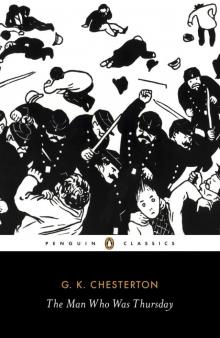 The Man Who Was Thursday: A Nightmare
The Man Who Was Thursday: A Nightmare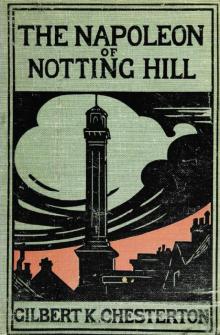 The Napoleon of Notting Hill
The Napoleon of Notting Hill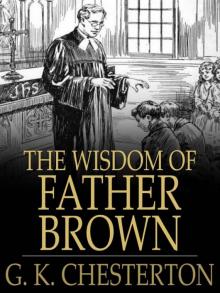 The Wisdom of Father Brown
The Wisdom of Father Brown G K Chesterton- The Dover Reader
G K Chesterton- The Dover Reader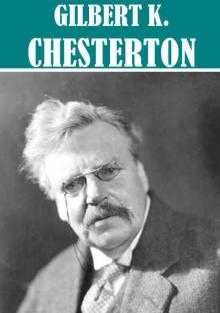 The Essential G. K. Chesterton
The Essential G. K. Chesterton The Trees of Pride
The Trees of Pride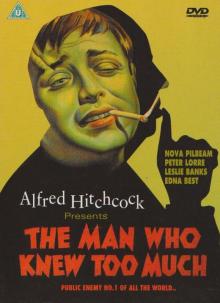 The Man Who Knew Too Much
The Man Who Knew Too Much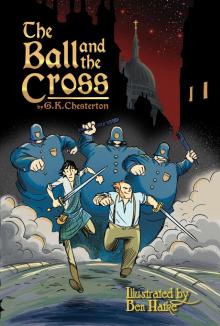 The Ball and the Cross
The Ball and the Cross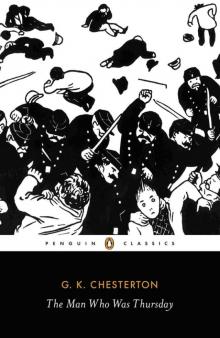 The Man Who Was Thursday (Penguin ed)
The Man Who Was Thursday (Penguin ed)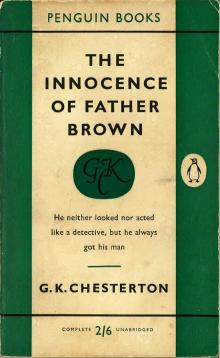 The Innocence of Father Brown
The Innocence of Father Brown The Victorian Age in Literature
The Victorian Age in Literature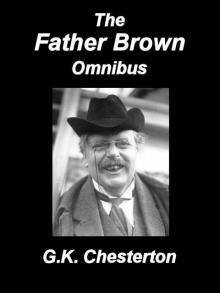 Father Brown Omnibus
Father Brown Omnibus Murder On Christmas Eve
Murder On Christmas Eve The Blue Cross
The Blue Cross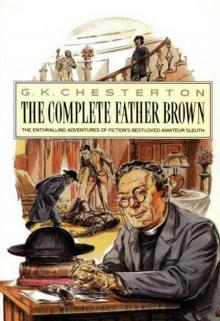 The Complete Father Brown Mysteries Collection
The Complete Father Brown Mysteries Collection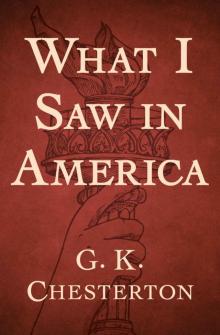 What I Saw in America
What I Saw in America